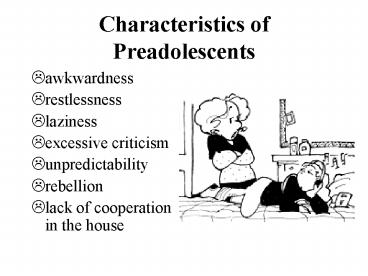Characteristics of Preadolescents PowerPoint PPT Presentation
1 / 20
Title: Characteristics of Preadolescents
1
Characteristics of Preadolescents
- awkwardness
- restlessness
- laziness
- excessive criticism
- unpredictability
- rebellion
- lack of cooperation in the house
2
Survival Kit for Parents
- Warmth
- Affection
- A sense of fairness
- Sense of humor
3
Adolescents
- Historical Perspective
Prior to 1970 storm stress parent
adolescent conflict was expected
focus parent survival
4
Adolescents
- Period 1966 1972 empirical
- studies challenged previous views
- 75 of teenagers reported having
- pleasant relationships with their parents.
- detachment, identity seem not to take a
- toll on the family
- 25 of families had histories of family
- difficulty prior to adolescence.
5
Professional working with parents of teens
- Should we program for parents as if adolescence
is a difficult time, or assume that what parents
need is reassurance and not assistance?
6
What does research tell us about conflict in the
family at adolescence?
7
Parents and adolescents have different sets of
expectations and ideas about the social
conventions that regulate family life
- Code of right and wrong
- Personal choice
8
In a study about parent/adolescent transition 40
of the parents studies experienced two or more of
the following
- lower self-esteem
- diminished life satisfaction
- increased anxiety and depression
- self-analysis about middle age
9
- Lack of Parent Support relates to
- deficient cognitive development
- delinquency
- lack of moral guidance
- external locus of control
- delinquency
- unhealthy self- esteem
- low academic achievement )Second, the combination
- Parent Support relates to
- cognitive development
- conformity to adult standards
- moral behavior
- internal locus of control
- social acceptance
- healthy self-esteem
- academic achievement
10
Parental Support relates to
- ?Cognitive development
- ?Conformity to adult standards
- ?Moral behavior
- ?Internal locus of control
- ?Social competence
- ?Self esteem
- ?Academic achievement
11
Authoritative Parenting During Adolescence
- Authoritative parenting works because it does
three things - )First, the nurturance and parental involvement
make the child more receptive to parental
influence, enabling more effective and efficient
socialization. - )Second, the combination of support and structure
facilitates the development of self-regulatory
skills, which enable the child to function as a
responsible, competent individual, even when
parents are not around.
12
Authoritative Parenting During Adolescence
- ) Third, the verbal give and take characteristic
of parent-child exchanges in authoritative
families engages the child in a process that
fosters cognitive and social competence, thereby
enhancing the childs functioning outside the
family. - (Steinberg, Laurence, Temple University)
13
Eriksons Psychosocial StagesIdentity Versus
Identity Diffusion
14
Four Basic Functions ofFamilies with Adolescents
- Meeting Basic Needs
- Protecting Adolescents
- Guiding and Supporting Behaviors
- Advocacy
15
Three Messages For Parents
- 1.Parents make a difference what you do
matters. - 2.Parents continue to make a difference when
their
children are teenagers its never too late to
become a good parent and never time to stop being
one. - 3.Teenagers fare better when their parents are
authoritative responsive and demanding. - (Steinberg, Laurence, Temple University)
16
Factors Influencing A Sense Of Personal Identity
- Cultural Expectations
- Positive Family Relationships
- Social Conditions
- Future Orientation
17
Keys to Prevention and Resolution of
Parent-Adolescent Conflict
- Tolerance for contemporary styles of dress and
music - Joint decision making
- Respect for teens opinion
18
Keys to Prevention and Resolution of
Parent-Adolescent Conflict
- Low degree of parental power and authority
- Warmth, acceptance, nurturance and letting go
- Parental interest and involvement in the
adolescents activities - Knowing names of friends
- Showing appropriate interest in the specifics of
activities - Participating in appropriate athletic and social
events
19
Tips For Parents of Adolescents
- Maintain positive and open communication with
teen - Let the teenager know that she matters to you
- Use inductive, authoritative discipline that
combines the right amount of support and
noncoercive control - Maintain an atmosphere of warmth, acceptance, and
understanding - Be alert to warning signs of gang activity and
substance abuse
20
Tips For Parents of Adolescents
- Recognize that the adolescents quest for
identity may manifest itself in cliques, fads,
and experimentation with diverse ideologies - Provide the adolescent with appropriate
information and honest feelings about sexual
activity. Be alert to warning signs of early
sex. - Provide appropriate supervision and monitoring of
teens activities while respecting his right to
certain amount of privacy - Obtain information on preventing substance use,
gang activity, and early sexual activity

